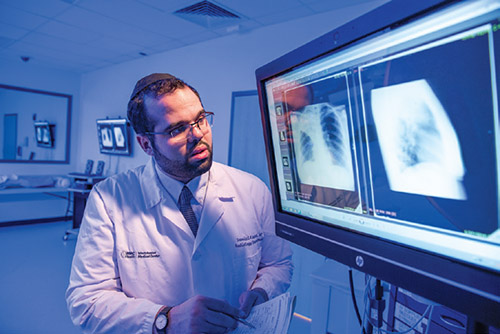

(Courtesy of Touro College) Match Day is one of the most anticipated moments in a medical student’s life, and thousands across the country eagerly await the envelopes that notify them of their residency assignments. Daniel Kadosh, M.D., of Passaic, a 2016 graduate of Touro’s New York Medical College, will always remember his anticipation just before he tore open his envelope two years ago and saw that he was accepted to a shomer Shabbat residency in diagnostic radiology at Westchester Medical Center.
Residency is an intensive training period for young doctors. After medical school, newly minted physicians work in hospitals under the direction of experienced MDs to gain practical experience. Residents typically work up to 80 hours a week. It’s exhausting for every doctor, but for Jewish students, negotiating the seven-day-a-week schedules adds an additional challenge. They need to balance a demanding hospital schedule with family and home life while observing Shabbat.
New York Medical College (NYMC), a member of the Touro College and University System, is at the forefront of efforts to make residencies more manageable, especially for Orthodox Jewish students. In partnership with Westchester Medical Center, NYMC now offers shomer Shabbat residency slots in six different specialties, more than any other medical school in the country.
Shomeratresidencies enable Orthodox Jewish residents to complete their training while observing the Jewish law requiring them to abstain from work from sunset on Friday to sunset on Saturday. “We make all reasonable attempts to accommodate Shabbat and Yom Tov. However, patient emergencies come first, as saving lives always takes precedence,” said Dr. Edward Halperin, chancellor and chief executive officer and chief executive officer of New York Medical College.
Shomer Shabbat residents are eager to share their experiences in the program. “We are like any other resident with the exception that we don’t work on Friday night or Saturday. The goal is parity, not preferential treatment, so we all find ways to make up the time. In my case, that means I do more Sunday calls. I’m incredibly appreciative of this accommodation. I always go the extra mile to show my appreciation and support my colleagues,” said Dr. Kadosh.
With three young children at home and a wife who is also a physician, Dr. Kadosh’s free time is at a premium. The shomer Shabbat program enables his family to spend a full day a week together, offering a respite from busy lives.
Kadosh graduated from Touro’s New York Medical College, which is nationally known for its culture that supports Orthodox Jewish students. The medical school offers kosher food in the cafeteria, a daily minyan and optional Torah lectures. There is an eruv on premises and school closes for Jewish holidays and ends early on Friday afternoons, Erev Shabbat. There are mezuzot on doorposts in public areas, as well as in private offices, as requested. Students, staff and faculty can daven in a dedicated synagogue space.
Physicians can apply for positions in diagnostic radiology, pathology, psychiatry, internal medicine, general surgery and pediatrics at Westchester Medical Center. Shomer Shabbat residents work as many hours as other physicians and are expected to handle emergencies even on Shabbat and holidays, but they are not scheduled for routine duties on those days. Instead, they cover the days their fellow residents might want off, like Christmas, Easter, nights and Sundays. Rather than adding an extra burden to other residents, the program opens up scheduling opportunities for all.
The program also strengthens Westchester Medical Center’s ability to provide culturally sensitive care to patients from nearby Orthodox communities in Rockland County. In order to support its diverse medical residents, the school has also developed a diversity-focused mentoring program to promote a non-judgmental environment.
“Offering shomer Shabbat residencies is an easy decision,” said Dr. Halperin. “It doesn’t affect patient care or raise costs. It isn’t complicated to do. As the nation’s largest Jewish academic institution, it makes sense for us. After all, if we don’t do it, and do it well, who else will?”










